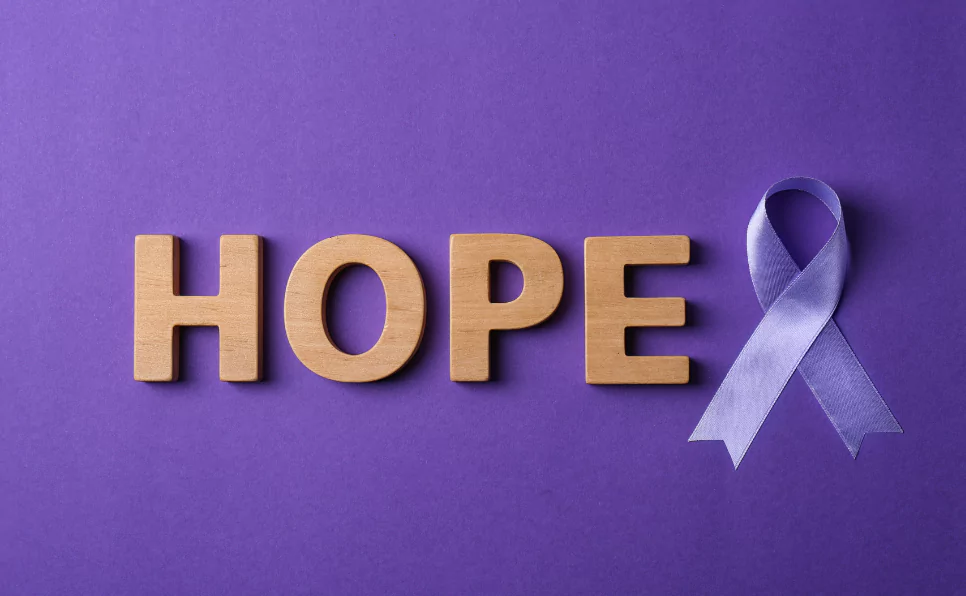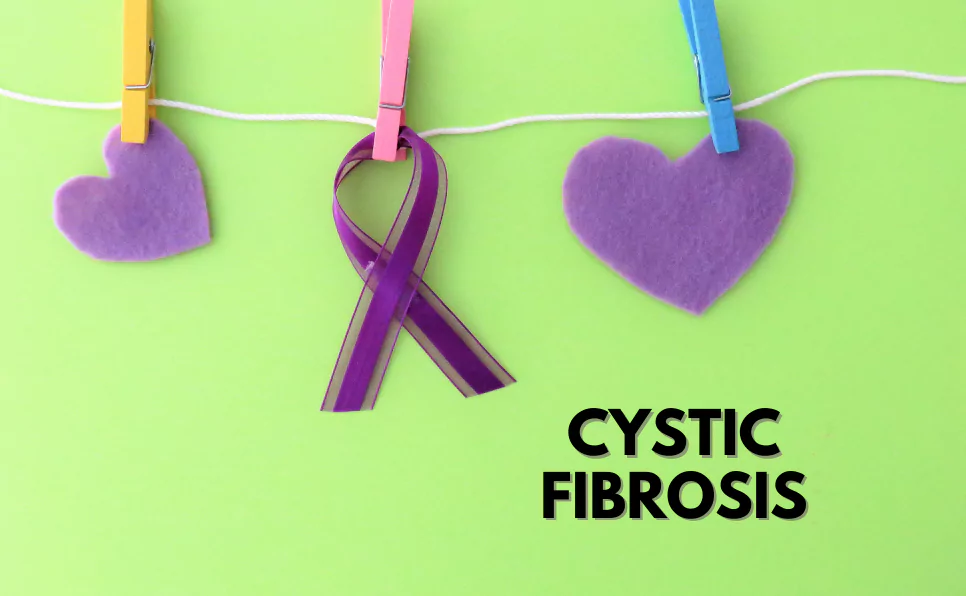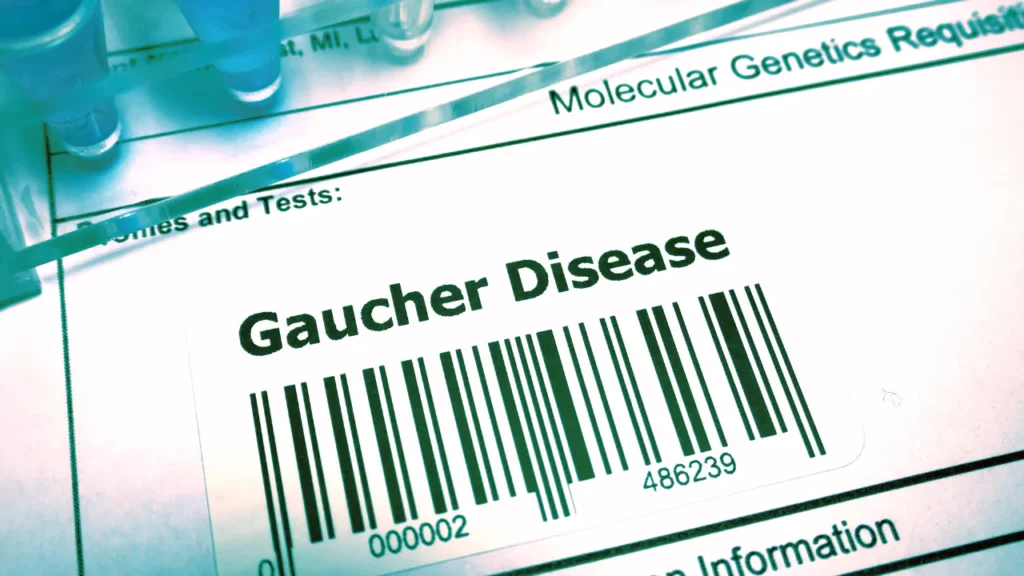Cystic fibrosis, or CF for short, is a rare genetic disorder that affects mostly the lungs, but also the pancreas, liver, kidneys, and intestine.
CF happens when a specific gene doesn’t work correctly, leading to a faulty protein. This protein normally helps balance the water and salt in our bodies, but when it’s broken, it causes secretions in various organs to become thick and sticky, which is a major part of the fibrosis cyst problem.
In this article, we will discuss details about the genetic basis of CF and how screening can be useful for people at risk.
Quick Overview:
Want quick information: Cystic fibrosis results from mutations in the CFTR gene, crucial for regulating salt and water movement in cells.
To develop CF, an individual must inherit two faulty CFTR genes, one from each parent, making it an autosomal recessive condition.
Carriers, having one faulty gene, remain symptom-free but can pass the mutation to their offspring.
CF symptoms vary, including respiratory issues, digestive problems, and other complications, with improved life expectancy due to better management.
Treatments focus on symptom management and include medication, physiotherapy, and possibly lung transplantation.
Carrier screening for CF, involving blood or saliva tests, is vital for family planning and prenatal decision-making. It identifies carrier status, guiding prospective parents in assessing their child’s risk of inheriting CF.
Continue reading to know more about CF’s genetic basis and the importance of screening for at-risk individuals.
Genetics of Cystic Fibrosis
Cystic fibrosis (CF) is a genetic disorder that arises from mutations in the CFTR gene, known as the cystic fibrosis transmembrane conductance regulator gene. This crucial gene regulates the movement of salt and water into and out of our body’s cells. To develop cystic fibrosis, an individual must inherit two mutated copies of the CFTR gene, one from each parent, a pattern of inheritance known as autosomal recessive.
If a person inherits just one mutated CFTR gene and one normal gene, they become a carrier of cystic fibrosis. While carriers do not exhibit symptoms of the disease themselves, they have a chance of passing the mutated gene to their children, potentially affecting their offspring’s health.
Symptoms of Cystic Fibrosis
The symptoms of cystic fibrosis can vary widely. While some people may not have noticeable symptoms until later in life, others might start showing signs right from birth or early childhood. Some of the key symptoms of CF include:
- Respiratory problems: Difficulty in breathing, frequent lung infections, and long-term inflammation and scarring of the lungs.
- Digestive issues: Trouble breaking down food, weight loss, and pancreas-related problems such as fibrosis cysts and diabetes.
- Other complications: Problems with the reproductive system, bone health issues, kidney stones, and abnormal sweating.
Life expectancy for people with cystic fibrosis has improved significantly in recent years due to better screening and treatment. On average, people with CF in developed countries can expect to live between 42 and 50 years.

Management of Cystic Fibrosis
Although there’s no cure for cystic fibrosis yet, treatments available can help manage the symptoms, reduce complications, and improve the quality of life of people with CF. These treatment strategies can include:
- Medication: Antibiotics, mucolytics, bronchodilators, anti-inflammatories, CFTR modulators, pancreatic enzyme replacement therapy (PERT), and vitamin supplements.
- Physiotherapy: Helps clear the mucus from the lungs and improve breathing.
- Lung transplantation: For people with severe lung damage that is unresponsive to other treatments.
Cystic Fibrosis Carrier Screening
Being a carrier of cystic fibrosis means you have one normal CFTR allele and one mutated one. While you won’t have signs of cystic fibrosis, you can still pass the cystic fibrosis mutation to your children. If both parents carry this gene, they have a 25% chance of having a child with cystic fibrosis in each pregnancy. This is why you should get a cystic fibrosis carrier screening if you’re considering having kids or are already pregnant.
How Can I Determine if I Am a Cystic Fibrosis Carrier?
Determining if you are a carrier for cystic fibrosis (CF) is straightforward through carrier screening, which is typically conducted via a simple blood or saliva test. Given that cystic fibrosis is caused by mutations in the CFTR gene, with over 1,000 identified mutations contributing to the condition, carrier screening focuses on detecting the most prevalent of these mutations.
While the screening covers many mutations, it’s crucial to note that it identifies approximately 85% to 90% of CF carriers in the Caucasian population. This means that while the test is highly effective, it may not detect all carriers, particularly those with less common mutations or individuals from diverse ethnic backgrounds.
Why is Carrier Screening Important?
Although the choice to get a carrier screening for cystic fibrosis is entirely yours, it can give you valuable information if you want to have children. Here are some reasons why it’s beneficial:
- Spotting Carriers: Carrier screening can find out if people carry the mutated CFTR gene, even if they show no signs or don’t have a history of cystic fibrosis in their family. This information can help them make decisions about their health and family planning.
- Determining Risk for Children: Carrier screening can calculate the chance of a child having cystic fibrosis based on the parents’ carrier status. This helps them get ready for the possibility of having a child with special needs and consider prenatal testing if they want.
How is Carrier Screening Done?
You can get carrier screening for cystic fibrosis before or during pregnancy. There are different tests available:
- Blood tests: A blood sample is taken from your arm and sent to a lab. The lab looks for common mutations in the CFTR gene that cause cystic fibrosis.
- Saliva tests: A sample of your saliva is collected by swabbing your cheek or having you spit into a tube. Just like the blood test, it’s sent to a lab to look for common cystic fibrosis mutations.
- Prenatal testing: If you’re pregnant and want to know if your baby has cystic fibrosis or is a carrier, you can have these tests:
- Chorionic villus sampling (CVS): A small sample of tissue from the placenta is taken through the cervix or abdomen between the 10th and 13th weeks of pregnancy. This sample is analyzed for CFTR gene mutations.
- Amniocentesis: A small amount of fluid from the sac around the baby is taken through the abdomen between the 15th and 20th weeks of pregnancy. This fluid is analyzed for CFTR gene mutations.
Carrier screening for cystic fibrosis only tells you if your chances of having a child with cystic fibrosis are higher or lower. If you or your partner test positive for being a carrier, it’s a good idea to talk with a genetic counselor or a healthcare provider who specializes in cystic fibrosis to discuss your options and the next steps.
Family Planning for Carriers of Cystic Fibrosis
Cystic fibrosis (CF) is a genetic condition that sticks around for life, messing with the lungs, digestion, and other body parts. There isn’t a cure for CF, but there are ways to help manage how it affects you. CF can even affect the ability to have kids and choices around planning a family.
The likelihood of having a child with Cystic Fibrosis
Cystic fibrosis is caused by a mistake, or mutation, in the CFTR gene. To have cystic fibrosis, a person needs two copies of this faulty gene, one from mom and one from dad. If a person only gets one copy of the faulty gene, they’re called a carrier but don’t show any cystic fibrosis symptoms.
The odds of having a child with CF depends on whether both parents carry the CF gene or not. If both parents are carriers, their child has a 25% chance of having CF, a 50% chance of being a carrier, and a 25% chance of neither having CF nor being a carrier.
If only one parent carries the gene, there is a 50% chance their child will also be a carrier and a 50% chance the child will be completely free of the CF gene. If neither parent carries the gene, their child will not have CF or carry the gene.
Emotional and financial toll
Having a child with CF can take an emotional and financial toll on the family. Parents might experience stress, anxiety, guilt, grief, anger, or depression as they deal with their child’s diagnosis and treatment. They might also struggle with balancing work, family, and personal life and providing emotional support to their other children.
Caring for a child with CF can be expensive, with frequent doctor visits, medications, therapies, equipment, and hospital stays. On average, a person with CF lives to be 37 years old, but some people may live longer or shorter lives depending on how severe their CF is and what treatments are available.
Options for planning a family
If you or your partner carry the CF gene mutation or have a family history of CF, you might want to consider your family planning options. There are several ways to lessen the risk of having a child with CF or to find out if your child has CF before or after birth.
Natural conception and prenatal testing
One choice is to conceive naturally and use prenatal testing during pregnancy to see if your unborn baby has CF or is a carrier. This testing can be done by chorionic villus sampling (CVS) or amniocentesis.
CVS involves taking a small sample of tissue from the placenta between 10 and 13 weeks of pregnancy. Amniocentesis takes a small sample of fluid from around the fetus between 15 and 20 weeks of pregnancy. Both tests can detect most of the common mutations that cause CF.
Prenatal testing can help you prepare for having a child with CF or make decisions about continuing or ending the pregnancy.
However, prenatal testing also carries some risks, such as miscarriage, infection or harm to the fetus. You may also face ethical questions about whether to end a pregnancy based on genetic information.
Preimplantation genetic diagnosis with IVF
Another option is to use preimplantation genetic diagnosis (PGD) with in vitro fertilization (IVF). PGD involves creating embryos in a lab by mixing eggs and sperm from the parents or donors. The embryos are then tested for CF mutations before being transferred to the uterus. Only embryos that do not have CF or are carriers are selected for implantation.
PGD can help you avoid having a child with CF or reduce the risk of passing on the mutation to your child. However, PGD also has some limitations, such as high cost, low success rate, potential health risks for the mother, and ethical concerns about discarding or donating unwanted embryos.
Use of donor sperm or eggs
A third option is to use donor sperm or eggs from someone not a CF carrier. This can be done by artificial insemination or IVF. The donor can be a relative, a friend, or an anonymous person from a sperm bank or an egg donation agency.
Using donor sperm or eggs can help you have a child who is not affected by CF or is a carrier. However, using donor sperm or eggs also comes with some drawbacks, like loss of genetic connection, legal issues, social stigma, and emotional challenges.

Psychological and ethical considerations
Planning a family when you carry the CF gene can be a complex and personal decision that involves psychological and ethical considerations.
You may want to talk with a genetic counselor, healthcare provider, or mental health professional to help you weigh each option’s benefits and risks and cope with the emotional aspects of the process.
You may also want to talk to your family members, friends, or other people who have gone through similar situations to get their support and advice.
FAQs
How accurate is the cystic fibrosis carrier test?
The cystic fibrosis carrier test is highly accurate, identifying about 85% to 90% of carriers in the Caucasian population. However, its accuracy can vary among different ethnic groups due to the specific mutations tested.
How do you test for cystic fibrosis carrier in adults?
Testing for a cystic fibrosis carrier in adults involves a blood or saliva test that screens for mutations in the CFTR gene, responsible for cystic fibrosis. It’s a non-invasive procedure that can identify most carriers.
Can the parents be tested to see if they are carriers of cystic fibrosis?
Yes, parents can undergo carrier testing for cystic fibrosis through a blood or saliva test. This screening helps determine if they carry mutations in the CFTR gene, indicating a risk of passing CF to their children.
What if only one parent is a CF carrier?
If only one parent is a CF carrier, there is no risk of having a child with cystic fibrosis, but the child has a 50% chance of being a carrier.
What are the odds of being a carrier of cystic fibrosis?
The odds of being a carrier of cystic fibrosis vary by ethnicity; about 1 in 25 Caucasians, 1 in 65 Africans, and 1 in 46 Hispanics are carriers.
Can you be a carrier of cystic fibrosis without family history?
Yes, individuals can be carriers of cystic fibrosis without a family history. Carrier status is often unknown until genetic screening is performed.
What are the odds of having a baby with cystic fibrosis?
If both parents are carriers, there’s a 25% chance with each pregnancy of having a baby with cystic fibrosis.
Is cystic fibrosis an autosomal recessive trait?
Yes, cystic fibrosis is an autosomal recessive trait, meaning a child must inherit two copies of the mutated gene, one from each parent, to have the condition.
Can you have cystic fibrosis if only one parent is a carrier?
No, cystic fibrosis requires two mutated genes, one from each parent. If only one parent is a carrier, the child won’t have CF but may be a carrier.
Is cystic fibrosis lethal recessive?
Cystic fibrosis is considered a severe autosomal recessive genetic disorder, which can be life-shortening, but advances in treatment have significantly improved life expectancy.
What type of dominance is cystic fibrosis?
Cystic fibrosis is characterized by autosomal recessive inheritance, meaning two copies of the mutated gene are necessary for the disease to manifest.
Is cystic fibrosis dominant or recessive?
Cystic fibrosis is a recessive disorder, requiring a child to inherit a defective gene from both parents to develop the disease.
Why can’t cystic fibrosis be cured?
Cystic fibrosis can’t be cured because it is a genetic disorder caused by mutations in the CFTR gene, affecting various organ systems. However, treatments can manage symptoms and improve quality of life.
What is the life expectancy of a person with cystic fibrosis?
The life expectancy for someone with cystic fibrosis has improved significantly, with many living into their 40s and beyond due to advancements in treatment.
Is CF more common in males or females?
Cystic fibrosis affects males and females equally, as the disease is genetic and not linked to sex chromosomes.
Why does cystic fibrosis shorten lifespan?
Cystic fibrosis shortens lifespan due to complications like lung infections and respiratory failure, stemming from the thick, sticky mucus characteristic of the disease.
Final Words
Cystic fibrosis is a serious genetic condition that impacts the lungs, digestive system, and other body parts.
Carrier screening is a genetic test that can help you find out if you or your partner carry the CF gene mutation. Carrier screening can help you make informed decisions about your reproductive options and reduce the risk of having a child with CF.
If you or your partner carry the CF gene, you have several options for planning a family, such as natural conception and prenatal testing, preimplantation genetic diagnosis with IVF, or use of donor sperm or eggs. Each option has its own pros and cons, as well as psychological and ethical implications.
There’s no right or wrong answer when it comes to planning a family when you carry the CF mutation. Your best option may depend on your values, preferences, circumstances, and goals. You might want to seek professional guidance and emotional support to help you make the best choice for you and your family.
Research on cystic fibrosis is ongoing and may lead to new treatments and cures in the future. Scientists are working on developing gene therapy, stem cell therapy, drug therapy, and other methods to fix the faulty CFTR gene or improve how it works. These advancements might offer new hope and opportunities for people with CF and their families.
References:
- https://rarediseases.info.nih.gov/diseases/6233/cystic-fibrosis/
- https://www.nhlbi.nih.gov/health/cystic-fibrosis
- https://www.mayoclinic.org/diseases-conditions/cystic-fibrosis/symptoms-causes/syc-20353700
- https://www.acog.org/womens-health/faqs/cystic-fibrosis-prenatal-screening-and-diagnosis
- https://www.cff.org/intro-cf/carrier-testing-cystic-fibrosis
- https://cystic-fibrosis.com/clinical/carrier
- https://www.nhlbi.nih.gov/health/cystic-fibrosis/diagnosis

Dr. Sumeet is a seasoned geneticist turned wellness educator and successful financial blogger. GenesWellness.com, leverages his rich academic background and passion for sharing knowledge online to demystify the role of genetics in wellness. His work is globally published and he is quoted on top health platforms like Medical News Today, Healthline, MDLinx, Verywell Mind, NCOA, and more. Using his unique mix of genetics expertise and digital fluency, Dr. Sumeet inspires readers toward healthier, more informed lifestyles.





